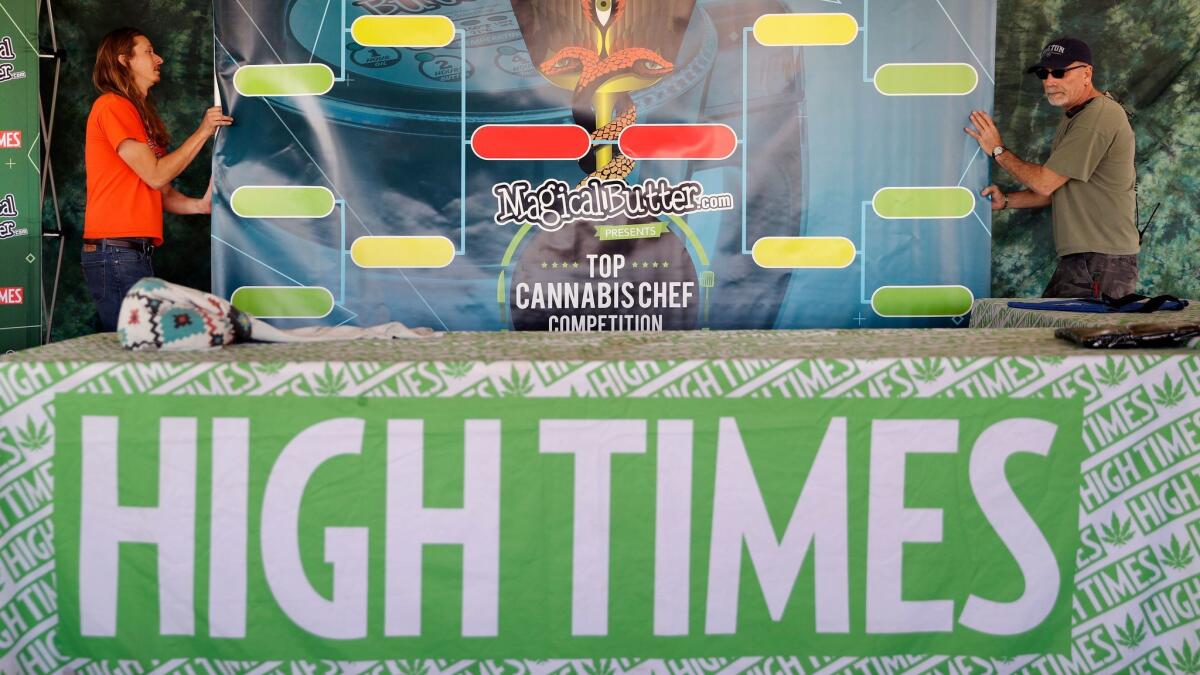Pot festival in Nevada goes forward despite fears of federal crackdown

Reporting from MOAPA PAIUTE RESERVATION, Nev. — The U.S. attorney’s office was clear in its letter to the Indian tribe and the organizers of the High Times Cannabis Cup — marijuana could not legally be bought, sold, transferred or consumed at the festival this weekend.
Perhaps that letter should’ve been sent to the thousands who attended Saturday as well.
For the record:
10:05 a.m. March 5, 2017An earlier version of this article stated that cocaine is a Schedule I drug. It is classified as a Schedule II drug.
Defiance wafted through the air, billowing from bowls, bongs and joints.
The dry dusty air may have contributed to reddening some eyes, but it was by no means the only culprit. The federal government may have said no marijuana was allowed at the Cannabis Cup, but the directive seemed to have the effect of gravel trying to stop water.
Like water, pot found a way.
Last fall Nevada voters easily passed an initiative to legalize the recreational use of marijuana, but the Cannabis Cup was being held about 45 miles northeast of Las Vegas at the Moapa Paiute Indian Reservation, and that’s under federal authority. Hence, the letter from the U.S. attorney’s office and the surprises that ensued.
At the Got Meds booth, a Michigan-based medical marijuana dispensary, a woman approached owner Mike Barron and asked what kinds of pot he had for sale while packing a bowl with weed.
“You do know you’re in violation of federal law right now just by holding that?” Barron asked.
The woman looked startled, laughed nervously and backed away.
Barron watched her for a moment until she disappeared into a crowd milling between booths selling T-shirts, food trucks and a group of performance artists. He turned to Dustin Yancey, his store manager who had been selling all manner of bongs — the most expensive being about $200 — for much of the morning.
Between customers, Yancey went to the back of the tent and took a hit off his own bong.
Barron said aside from a warning by local tribal police to not buy, sell or use weed, enforcement seemed lax — similar to what might be witnessed a Phish concert.
“They keep fighting against marijuana and yet, more places keep legalizing it,” Barron said. “It’s only a matter of time.”
Nevada was one of four to legalize recreational marijuana use in November — bringing that total to eight states. There are 28 states that allow marijuana for medical use. For advocates of marijuana, it marked a watershed as they pushed more than half the states to legalize marijuana in some capacity.
The Obama administration did not endorse legalization, but took a largely hands-off approach, reiterating that under federal law marijuana was still a Schedule 1 drug — like heroin — while still leaving states to mostly do as they pleased.
But remarks by recently confirmed U.S. Atty. Gen. Jeff Sessions brought some fears that there might be a renewed focus by the federal government to crack down on marijuana.
Sessions had said that “states they can pass the laws they choose” but emphasized “it does remain a violation of federal law to distribute marijuana throughout any place in the United States, whether a state legalizes it or not.”
Skittish senators in some states where marijuana has been legalized sent a letter to the Justice Department urging for a continuation of Obama-era policies that weren’t targeting pot, and Sessions has since said he wasn’t looking to begin a crackdown. On the other hand, Sessions also said the Justice Department was reviewing the issue.
Cannabis Cup spokesman Joe Brezny said there was a lot of communication between the event organizers, the Moapa tribe, state and county authorities and U.S. Atty. Daniel Bogden to make sure the event complied with the law, given tribal land is under federal jurisdiction and tribal police.
Cannabis Cup organizers didn’t believe the letter from Bogden reflected a change in federal strategy toward marijuana under President Trump.
“Zero,” Brezny said. “I’m not a Trump administration guy and I would call it that way if I thought it was because of that. I don’t see this as anything other than a continuation of the U.S. attorney’s office being cautious of public marijuana consumption at a public event.”
Trisha Young, spokeswoman for the U.S. attorney’s office in Las Vegas, said she would not comment on any enforcement strategies related to the Cannabis Cup.
Organizers said about 10,000 people bought tickets for the festival, which featured a nighttime concert headlined by Ludacris.
The Moapa Events Center was right off Interstate 15, and a stream of cars curled past a gas station and small casino where they parked in a dirt lot. Inside the festival, rows of booths with merchants peddling weed wares tried to keep some of their products from blowing away.
A giant balloon advertising a seed store based in Huntington Beach had to be hauled down by a dozen people after winds got too strong.
If some festivalgoers chose to relax without the benefit of marijuana, several massage booths were available. Throughout the festival, people swayed to music from E-40, Snoop Dogg and Kelly Price.
And it was hard to walk anywhere without seeing a poster, sign or T-shirt featuring a double-entendre. (“Just wanted to say high,” one sign proclaimed.)
But because the event had to adapt to the letter — informing merchants at the last minute that they couldn’t sell marijuana and that it couldn’t be ingested — it was supposed to be officially pot-free.
That put a crimp in the cooking competition, in which chefs were supposed to be set up against each other, bracket style, and make dishes infused with cannabis.
Alisha Brown of Las Vegas faced off against Brian Peace, with both making Italian dishes for a panel of three judges who drove from Salt Lake City. But at the last minute, all the cannabis-based cooking oils had to be replaced with regular oils.
“Now it’s essentially a cooking competition,” Brezny said.
Peace, who beat Brown to advance to the next round, said the change in plans affected the entire approach to cooking. And both chefs said it removed some of the luster from the event.
“It’s making progress,” Brown said of the march toward pot legalization. “I hope we can get to a point where it’s just not an issue anymore.”
Some attendees believed legalization wasn’t slowing down and that as more states pass marijuana legislation, it will eventually reach a critical mass.
Phil Russo, who runs a medical marijuana business in Michigan, said he would like to see pot legalized federally to remove the barriers to using banks and allow his patients to use credit cards. With the federal prohibition still in place, banks won’t serve marijuana businesses, which has created security headaches for establishments that deal with lots of cash.
But Russo, eating a slice of pizza on a patch of grass near the concert stage as the dry wind kicked up, said momentum is still on marijuana’s side.
“The states are driving it,” he said. “I don’t think that’s going to stop anytime soon.”
Twitter: @davemontero
ALSO
California officials and the marijuana industry prepare to fight a federal crackdown
Sixth person arrested in fatal beating of Mendocino County pot farm operator
Hiltzik: The murkiness of marijuana law is becoming a flashpoint in U.S.-California relations
More to Read
Sign up for Essential California
The most important California stories and recommendations in your inbox every morning.
You may occasionally receive promotional content from the Los Angeles Times.











